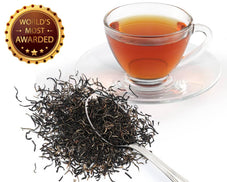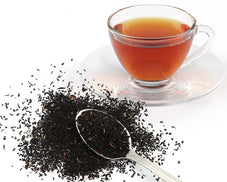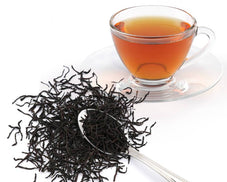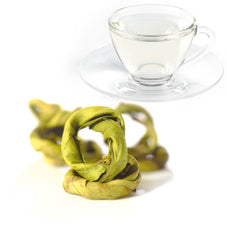
Opposing cups: the obvious superiority of tea over coffee?

Tea? Coffee?...
For most, the choice is based on personal preference driven by individually acquired taste, health and consumption implications be damned. But as civilization ‘progresses’, humanity feels an increasing need to validate their consumption choices. The on-going argument to reach a verdict on which beverage deserves that place in the sun as the finer pick came about as a result.
Multiple studies and research over the years have provided adequate backing for both tea and coffee, leaving us stuck at square one with no conclusion reached. No, the argument is not going to be repeated here with its countless stalemates. Perhaps, a more objective exploration on how one might be a better alternative to the other may be apt in consideration of global harmony and its sustained continuity.
We do not want a war between the tea and coffee drinkers of the world!
The battle for antioxidants
Because both beverages have their respective fan bases around the world, the question boils (pun intended) down to just one question; which is the healthier option? The answer to this question lies in the chemical composition of both beverages, specifically the element of antioxidants.
What are antioxidants?
In a very basic sense, antioxidants are molecules that fight damage caused by free radicals; unstable molecules that can cause harm to cellular structures. Antioxidants contribute electrons to the free radicals, effectively neutralizing them. Read up more on antioxidants in the Healthline article written by Atli Arnarson. However, free radicals are not all bad as they aid in fighting bacterial infections, and the human body needs a certain balance between them and antioxidants.
Antioxidants are vital for survival and can be found in nearly all food types of both plant and animal origin. Plants in particular carry a greater abundance and wider diversity of antioxidants compared to any other food source, which is why both tea and coffee are credited to be high in their containment of them.
So, who’s got the better of it?
As stated previously, both tea and coffee are considered to be particularly good sources for antioxidants. Even though evidence is conflicting and inconclusive, in most cases tea has triumphed over coffee purely on the basis of containing a higher variety of antioxidants.
Camellia Sinensis, otherwise known as the tea plant, is rich in antioxidants known as polyphenols. Black tea, which is the more popular form of tea drunk globally contains the polyphenols thearubigin and theaflavin which neutralize free radicals, inhibiting their ability to cause cell damage. Green tea on the other hand comprises of the antioxidant catechin which is has a higher potency than the antioxidants found in black tea. Overall, tea has been found to contain approximately ten times the polyphenols found in fruits and vegetables.
Coffee is generally attributed to having a higher concentration of antioxidants per serving but does not have as high a variety of them as does tea. Tea therefore, affords drinkers way more health benefits than coffee does, as the many types of antioxidants contribute differently to bodily wellbeing.
Health benefits galore

With a greater composition of antioxidants and other properties come greater health benefits. Tea is the hitherto unrecognized champion of health beverages, naturally enriched to help boost one’s health in all kinds of ways.
- Lowers risk of heart disease – when good health is literally at heart, it’s tea to the rescue. The flavonoids contained in black tea reduce blood clots, improve the functioning of blood vessels and thereby strengthens cardiovascular activity reducing risk of heart disease. Similarly, polyphenols in Coffee may help the heart, but the high caffeine content can lead to increased blood pressure and a higher pulse rate.
- Diabetes prevention – Polysaccharides in black tea slow blood sugar absorption thus lowering the risk of Diabetes. Studies showed that an intake of one to two cups of black tea a day over a prolonged period of time had a 70% lower chance of developing type-2 Diabetes. Coffee on the other hand lowers the risk of type-2 diabetes by only 11% if consumed in similar quantities over a period of approximately four years or more as claimed by research.
- Weight loss – Antioxidants in black tea boost the body’s metabolism contributing to weight management. Additionally, consuming large amounts of black tea can also lower obesity levels by regulating blood sugar – causing a reduction in sporadic cravings. Coffee too is an appetite suppressant, but with too short a duration of its effect to positively contribute towards weight loss. At the same time, caffeinated coffee combined with fat inhibits the body’s ability to clear sugar from the blood leading to higher blood sugar levels.
- Improving bone strength – As shown by research, the epigallocatechin compound found in tea can decrease the numbers of osteoclasts in the body (cells that break down bone structure) and increase the numbers and activity of osteoblasts (the cells that build and strengthen bone structure). Conversely, coffee has not been found to contain any properties that contribute towards bone health.
As evidenced above, it seems the case for tea being the healthier option is quite convincing. However, that is not to say that Coffee is without any health benefits of its own. It should be clearly understood that the chemical composition of the two beverages are inherently different.
Coffee, with its specific antioxidants and other properties provide certain health benefits not contained in a cup of tea. Unfortunately, coffee also has a higher tendency to cause imbalances in bodily functions as briefly highlighted above, leading to adverse implications on one’s health in the long-run.
If your preference is not wholly governed by taste, it might be worth your while to consider switching over to tea as your regular cuppa. Chances are, you may become a believer for life when all those health attributes really start to prove.
The concern over caffeine
As popular ‘pick-me-up’ beverage choices, know that both tea and coffee contain the stimulant known as Caffeine. The rush or boost you may feel as you down your favorite cuppa is a direct result of the caffeine affecting your nervous system. Don’t worry, a cup or two of either can be part of a very healthy diet. However, an excessive intake of the stuff can cause hyperactivity, an increased heart rate, high blood pressure and on some occasions, gastrointestinal discomfort.
Between coffee and black tea, the latter has the lowest concentration of caffeine with approximately 47-milligrams of it held in a single brewed cup. Green tea has an even lower concentration of caffeine of just 29-milligrams in a similar serving. Coffee on the other hand is heavier in its caffeine content with around 92-milligrams contained in a single brewed cup.
The USDA recommendation is that people should not consume more than 400-milligrams of caffeine a day. The recommended intake may even be too high for some, as everyone metabolizes caffeine at varied rates and could have different levels of sensitivity to it.
For those who enjoy their coffee in copious amounts, tea would be the best and healthier alternative considering that it contains only half the amount of caffeine as found in coffee. You could still drink more tea than coffee in a day, and not have an overdose of caffeine in your system.
It’s a lifestyle thing
Consumption choices, in most cases go beyond just the functional aspect. Specially within more developed markets and with progressive individuals, consumption choices also reflect the lifestyle of that segment or individual. It’s the same with tea and coffee drinkers. While they sip at their favorite cuppa, they are also embracing the culture and lifestyle represented by their beverage of choice. And if you ask someone why they like a certain choice, they may even go so far as to say that they identify themselves with the more cultural aspects attributed to it.
Take coffee for instance, coffee is associated with a culture of fast-paced social interactions primarily driven by its inherently high caffeine content. It also necessitates a vibe of high energy even though in truth, black tea provides more stable energy through its amino acid properties of L-theanine which contributes to improved alertness and focus.
Tea on the hand is thought to be typically consumed in a slower-paced social environment, projecting a sense of intimacy in the act of consumption itself. Introverted in nature, it is a beverage to be sipped and savored, inadvertently self-attributing a certain level of sophistication.
Culture created through habit
Prolonged consumption habits create enduring stereotypes or associations as evidenced by the tea, and coffee cultures. Such associations can actually discourage consumers from trying out things differently, and breaking away from convention could actually yield benefits and pave the way for new experiences.
If you are someone who lives at a breakneck pace AND you’re hooked on to coffee for the energy it delivers, chances are you might be drinking a lot of it regularly. If you were told that beyond a certain level of intake, coffee was bad for you, what would you do? Cut down consumption or try out an alternative that would aid you differently to maintain life’s pace?
Tea can be a great alternative to coffee in terms of getting that rush of energy to complement a fast-paced routine. Although the effect is not as pronounced as of that delivered by coffee, it is more sustained, and effective in its ability to heighten focus. Conversely, coffee can be enjoyed in a laid-back setting, to be savored as a beverage of refinement.
Through marketing and cultural positioning, tea has always been perceived as a traditional and unadventurous beverage, even in parts of the world it enjoys higher popularity than coffee. As a result, coffee became identified as being trendy, hip and ideal to complement social interactions. But as of late, with the introduction of single-origin specialty and gourmet teas, a resurgence can be seen of the tea culture, with a complete turn-around on its long-perceived positioning and associations. Tea’s shrouded history has brought out a flair of exoticness to the beverage and its manufacturing, brewing and consuming process has made it akin in exclusivity to the wine and sake cultures.
The beverage of millennials
Younger generations are fast adopting the tea culture in more developed parts of the world as a trend. Particularly among millennials, who are attracted to unique and new experiences and experimentation, tea comes off as more than a beverage option. With its versatility, explored and found in the many blends from diverse geographic origins, tea has become an experiential journey for a discerning generation of consumers.
The myriad health benefits found in tea; especially those properties that contribute to glowing skin, stress alleviation and immunity boosting, are also seen as major ‘influencers’ for millennials; a segment that is increasingly concerned about physical attractiveness and wellbeing.
The concluding sip

The objective exploration that began with specific attributes of antioxidants contained in it, to the many proven health benefits and finally, its cultural significance for today, the case for tea has now come full circle to where it all starts at… choice.
See, coffee is not the devil’s drink and neither is tea the elixir of Gods (though most would disagree). Both beverages have their merits and depending on how you consume, demerits as well. However, scientifically and aesthetically it cannot be said that one is a perfect substitute for the other. It would seem more plausible that, through meticulous research and understanding of consumer trends that one might be a better alternative to the other.
With history spanning millennia, tea has come to its present form and state through an evolutionary journey. A force of its own, it will continue to evolve as new markets and consumption habits develop. For a cup that packs such goodness and vitality, tea is in a league of its own. As younger demographics significantly warm up to it, maybe it’s time for those who are more set in their ways to give tea a second sip.




